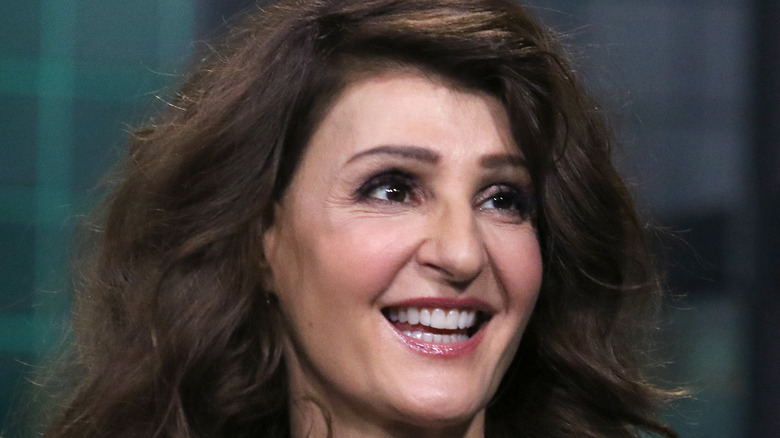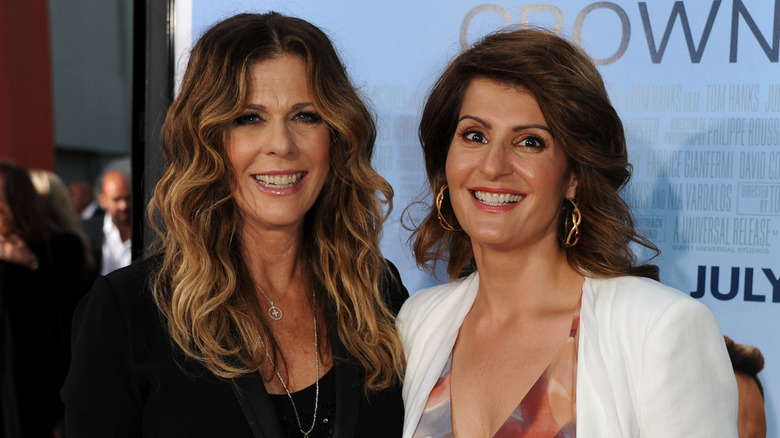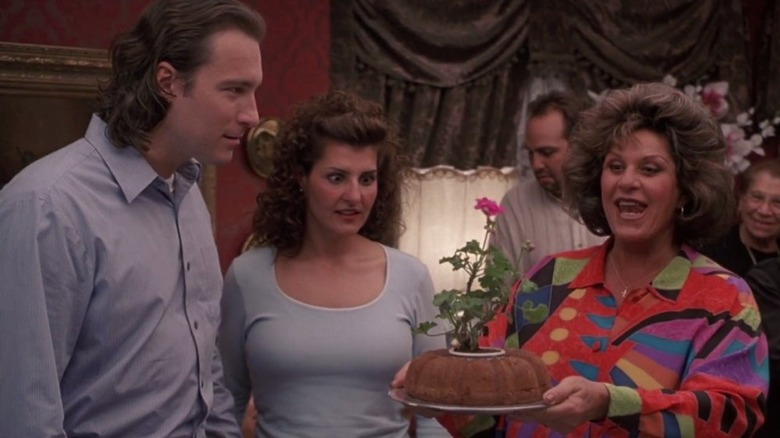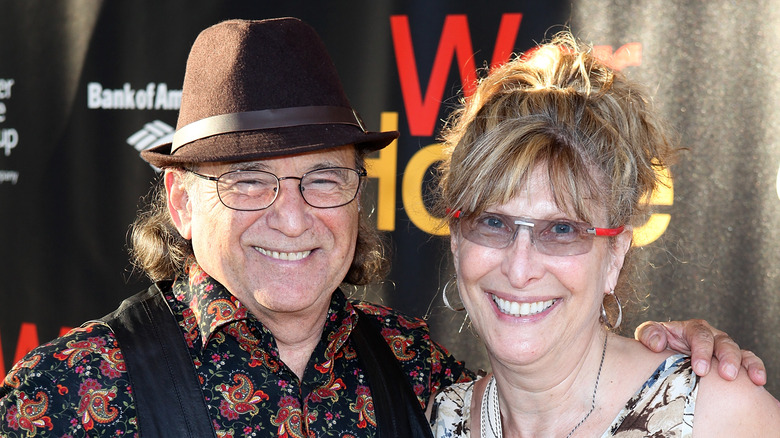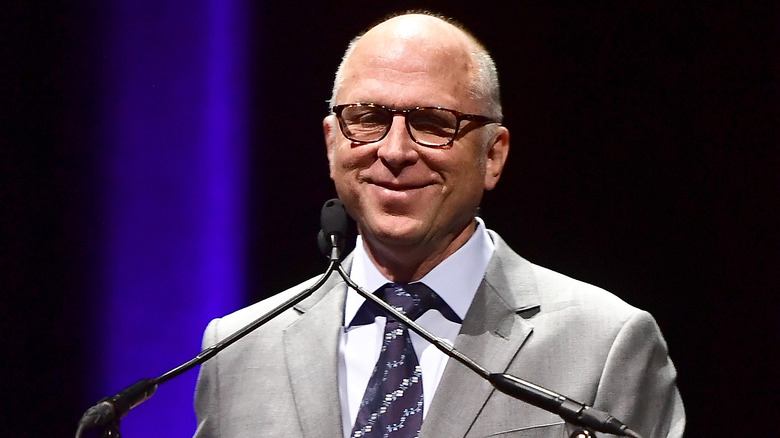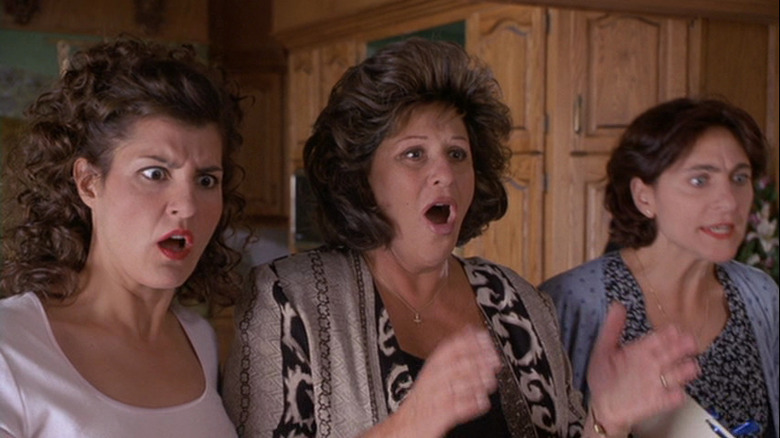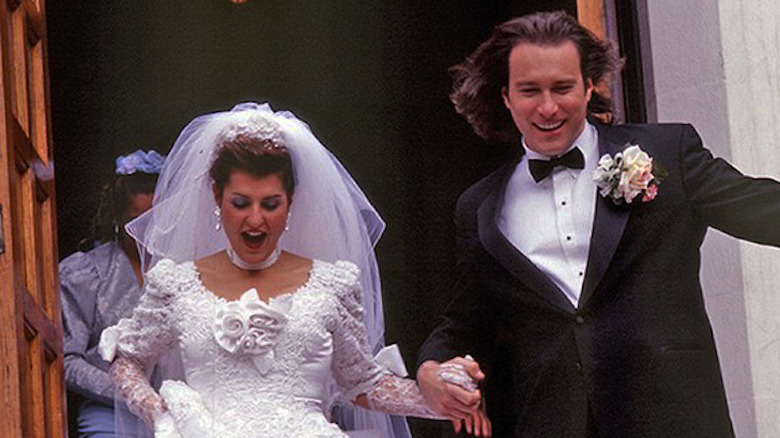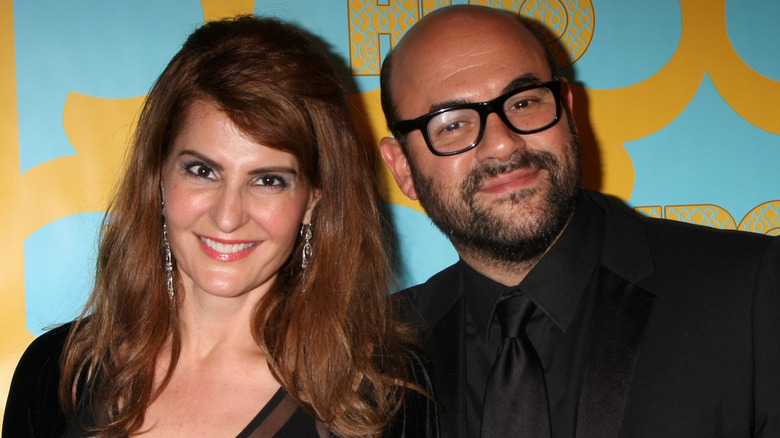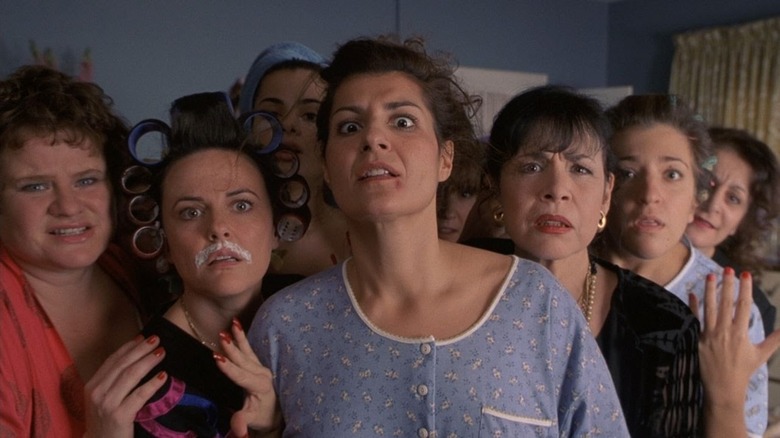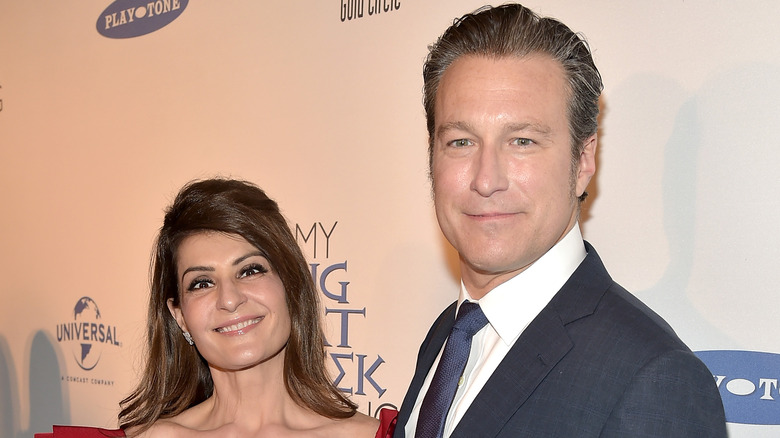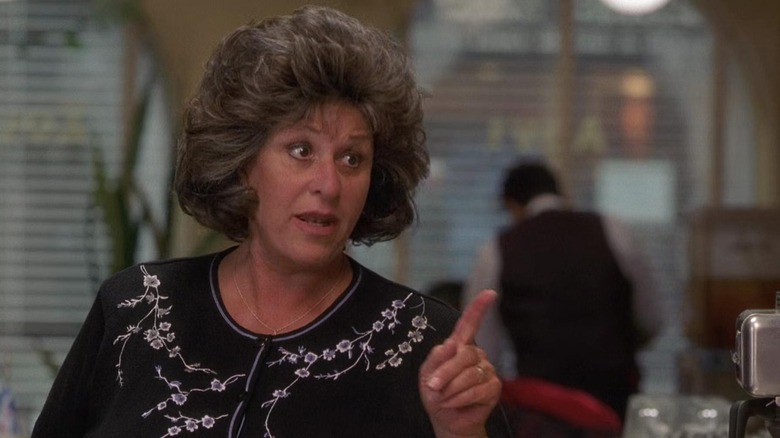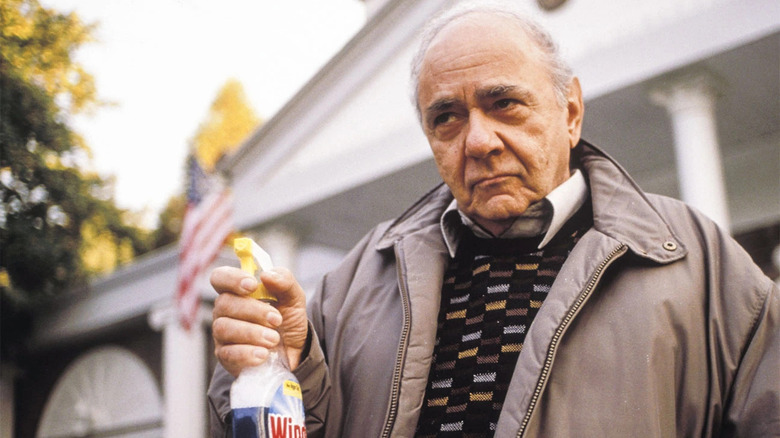The Untold Truth Of My Big Fat Greek Wedding
Though the well-oiled Hollywood machine can seem formulaic at times, sometimes surprises do happen. One such surprise was Nia Vardalos' "My Big Fat Greek Wedding," which recently celebrated its 20th anniversary. After an unconventional route to the screen (more on that below), "My Big Fat Greek Wedding" was a sleeper hit at the box office, grossing more than $350 million worldwide on only a $5 million budget (via Box Office Mojo). Despite being told time and time again that it wasn't gonna happen, the Greek-Canadian Vardalos was finally able to turn her passion project into a success. It wasn't just a financial hit but was a critical one as well and Vardalos was even nominated for an Oscar for Best Original Screenplay for her efforts.
Based on Vardalos' own experiences, "My Big Fat Greek Wedding" follows a Greek woman named Toula (Vardalos), who falls in love with Ian (John Corbett), a non-Greek man. Already considered a failure because she's not married at 30, Toula clashes with her traditionally Greek family as she tries to get them to accept Ian, all the while trying to come to terms with what it means to be a Greek woman in America. While Toula's experiences in the film are ripped right from Vardalos' own life, audiences around the country (and the world) were able to find things they connected to, which contributed to its success.
The film is filled with zany characters and outlandish stories, so it only stands that the story of the film's production is equally as dramatic (the Greeks did invent drama, after all). So, break out the Windex and read on to discover all of the surprising things you never knew about "My Big Fat Greek Wedding."
Nia Vardalos turned the screenplay into a stage show after being rejected
Nia Vardalos' screenplay for "My Big Fat Greek Wedding" had a rather unusual journey to the big screen. As she explained in a Twitter thread celebrating the film's 20th anniversary, Vardalos was fired by her agents and managers after she wrote the script because they were so unhappy with it. Not content to let go of the story, she decided to turn it into a solo stage show. This turned out to be the right move because one night, Rita Wilson was in the audience. Wilson herself is Greek-American and she liked it so much that she told her husband, Tom Hanks, to come see the play (via ABC News).
Wilson told Vardalos that the play should be a movie, and, luckily for her, Vardalos already had the script ready to go. Wilson and Hanks decided to produce the film under their own production company, Playtone, and the rest, as they say, is history.
As Vardalos noted on Twitter, this experience taught her to value her own voice, and not change because of other people's opinions: "Some people who don't create anything including jobs to make situations better, will tell you that what you do is wrong. You can't make anyone embrace change, marginalized voices or new ideas. So love yourself. And write your story."
Studios wanted to change the family's ethnic makeup
Though Vardalos ultimately made the decision to go with Wilson and Hanks' production company, there were other studios interested in the project at the time. The only problem was, these other studios wanted Vardalos to completely change the story. First of all, most of the other potential producers wanted Vardalos to hand over the lead role to a more recognizable actress. Vardalos recalls being afraid they were going to replace her with Julia Roberts, and she was not having it (via The Ringer). One studio even suggest they replace Vardalos with Sandra Bullock, according to The LA Times.
They also wanted Vardalos to change the family's ethnic background into something more "recognizable" – like making them Hispanic and casting Jennifer Lopez in the lead role. Another studio suggested the family be Italian and that Marisa Tomei should be cast as the lead (via The Greek City Times). Luckily, Playtone didn't want Vardalos to change any of the essential elements of the script, and they were perfectly happy with her playing the lead role. With Playtone's help, all of Vardalos' hard work finally paid off, and she didn't have to change who she was to get the film made.
HBO helped fund the project
While Playtone was the first company to sign on to produce "My Big Fat Greek Wedding," they weren't able to fund the film entirely on their own. So, they decided to get some help from an unconventional source. During this time, Hanks had a good working relationship with HBO, having worked on the miniseries "Band of Brothers" and "From Earth To Moon." So, Hanks and his producing partner Gary Goetzman went to HBO for funding (via The New York Times).
Surprisingly, HBO said yes. This was an unprecedented move, because HBO generally only supported movies that it planned to air on the network itself. But because Hanks had a special relationship with the company, (and you know, he's Tom Hanks), HBO decided to make an exception, and eventually went on to fund half of the film's budget. Playtone's other collaborator was a production company called Gold Circle Films, which took on the rest of the film's budget. Gold Circle was enthusiastic about the film: The president of the company, Paul Brooks, still calls Vardalos' screenplay "one of the best scripts I've ever read" (via The Ringer). While HBO initially thought the film would make a good direct-to-cable comedy, "My Big Fat Greek Wedding" would eventually get a theatrical release once IFC Films came on board.
Director Joel Zwick related to Vardalos' story
One of the best things about "My Big Fat Greek Wedding" is how specific the story feels to one woman's experience. But despite the fact that Vardalos wrote the screenplay with the particular experiences of a Greek immigrant family in mind, this didn't stop other people from relating to the film in their own unique ways.
One person who found the script to be especially relatable was the film's director, Joel Zwick. In a profile of the movie for The Ringer, Zwick — who is Jewish — noted that "The joke is that Nia wrote 'My Big Fat Greek Wedding' and I directed 'Fiddler on the Roof.'" While Vardalos wrote the movie based on her own family, Zwick also saw his family in the characters Vardalos had put down on the page.
Although Zwick had primarily worked in television prior to "My Big Fat Greek Wedding," when he received the script, he felt like he immediately understood it. "Even though it was about Greeks, it wasn't very far from the Jewish people," Zwick continued. This specific universality is exactly what wound up making the film so great and ultimately, such a massive hit.
One audience member laughed so hard she injured herself
You may have heard of people having physical or serious medical reactions to films. Usually, it's horror films, like the time at least a dozen people fainted during a screening of Julia Ducournau's "Titane" or all of the folks who passed out during "The Exorcist." One wouldn't expect there to be as many injuries at a romantic comedy like "My Big Fat Greek Wedding," but, as it turns out, anything is possible.
During the first screening he attended, Bob Berney — then the head of distribution for IFC — experienced something rather unexpected. One woman in the audience laughed so hard, she actually fell out of her seat and broke her hip (via The Ringer). While the screening had to be paused so the woman could receive medical attention, the event clued Berney in to not only how well audiences were reacting to the film, but also to how important the theatrical experience is to any movie — not just action or horror. Laughing together is just as important as being thrilled or shocked together, Berney figured, and he wanted to help create that lively atmosphere of the world on-screen within the audience as well.
The film's limited release strategy was key to its success
Following his first experience at a screening of "My Big Fat Greek Wedding," distributor Bob Berney came up with a plan to market the film to theaters. According to Alison Herman at The Ringer, the film was initially "marketed like a supersized version of the one-woman show." Early screenings were held at Greek Orthodox churches and fairs. This limited release strategy honed in on cities with large Greek populations (like Chicago) and expanded slowly to guarantee that each showing was a full house. Berney wanted to repeat the communal experience he felt at his first screening of the film.
The fairly limited release of the film increased demand, and ensured that the showings it did have were packed to the brim. As Berney told The LA Times in 2002, the film became so popular with moviegoers that IFC could "barely keep up" with theaters' demands for prints. Berney continued, "This was built from word of mouth and became a project of managing its own success." While the film's success was slow-building, it eventually made its mark, and remains one of the highest-grossing independent films of all time. It even overtook "The Lord of the Rings: The Two Towers" to become the fifth highest-grossing American film of 2002 (via Box Office Mojo). In spite of the recent rise of streaming services and preferences for at-home viewing, Berney still believes in the power of the theater-going experience and recently lent his hand to the rollout of the independent Japanese film "Drive My Car" to try to recreate some of the theater magic of "My Big Fat Greek Wedding."
Vardalos always had John Corbett in mind for the part
As the author of the screenplay, Nia Vardalos had certain actors in mind for the parts she wrote. From the beginning, she knew she wanted John Corbett — then known for his work on "Northern Exposure" and "Sex and the City" — for Ian Miller, her love interest in the film. It seemed like it wasn't going to work out, however, because she was told he wasn't available at the time.
Just before the start of production, Vardalos and Playtone executive Gary Goetzman were sitting in a hotel bar, bemoaning the fact that they didn't have anyone they liked for the part of Ian Miller (via ABC News). Then, as if he had been conjured up right then and there, John Corbett himself walked into the same bar. Vardalos and Goetzman overheard him talking to the bartender about his next project. He told the bartender he didn't know what he was going to do next, but he had just read this script for something called "My Big Fat Greek Wedding," and he wanted to be in it.
Stunned, Vardalos and Goetzman walked up to Corbett and began discussing it, learning that he was both interested and available in doing the film. By some trick of fate, the timing worked out perfectly, because the production had just been pushed back by two weeks. They began filming "My Big Fat Greek Wedding" just four days after that fateful conversation in the bar.
Vardalos decided to cast her then-husband in the film
While Nia Vardalos and John Corbett didn't know each other before filming, one of the cast members was someone she knew quite well. At the time, Vardalos was married to Ian Gomez, an actor you may know from "Felicity" and "Cougar Town." Vardalos knew she wanted to put Gomez in the film, but she didn't want to cast him as the love interest. "We didn't want to play a couple opposite each other because we felt like it's kind of a little presumptuous to tell an audience, 'Look how cute we are as a couple!'" she said in an interview with Bobbie Wygant in 2002. Vardalos went on to joke, "Actually, that's just a lie. I wanted to cheat, so I wrote a movie." So, in the end, Gomez played Mike, Ian's best friend.
While Vardalos and Gomez may no longer be together (they separated in 2017), it seems that Toula and Ian still are: Vardalos has announced plans for a third "My Big Fat Greek Wedding," starring much of the original cast. Although it's still up in the air whether or not Gomez will return.
Many lines in the film are real things Vardalos' family has said
Speaking with 20/20 in 2018, Vardalos revealed the inspiration behind the film: "When I started to write 'My Big Fat Greek Wedding,' all I did was write down everything that had ever happened to me." Some of the film's most memorable lines may seem hyperbolic, but many of them are ripped straight from Vardalos' own life. "'Greek women, we might be lambs in the kitchen, but we're tigers in the bedroom,' is something that my mother said to me while we were making chicken soup," Vardalos explained. "So I threw up in my mouth. And then I wrote it down."
Even the many quirks of Aunt Voula — played by legendary comedian Andrea Martin, per Vardalos' request — are based in truth. "My Aunt Voula really does have a lump on the back of her neck that is her twin," Vardalos shared, referencing one of the many oddities of the Portokalos clan. As they say, sometimes truth is stranger than fiction.
A hair stylist thought Vardalos and Corbett were having an affair
Before "My Big Fat Greek Wedding," Nia Vardalos had only done bit parts on television and some voice-over work, so she was nervous about certain aspects of filming. One of the things she was most anxious about were the kissing scenes, something she had never done before. "I've never done a kissing scene," she shared with 20/20. "I was like, 'What idiot wrote that? Oh, yeah. Me.'"
In order to calm her nerves, Vardalos asked Corbett if they could practice the kiss beforehand. Vardalos ran into Corbett as he was leaving the hair and makeup trailer, and they decided to practice the kiss right then and there. Vardalos said the practice helped a lot, and she wasn't nervous or embarrassed at all by the time they filmed the actual scene. The only problem was, they found out years later that they weren't alone during that fateful rehearsal. Unbeknownst to them, a hair stylist had walked out of the trailer while they were practicing the kiss, and immediately assumed Corbett and Vardalos were having an affair. So much for not being embarrassed.
The actress who played Vardalos' mother did her research
Though some of the cast of "My Big Fat Greek Wedding" were actually Greek — including Vardalos, of course, and the actor who played her father, Michael Constantine – not all of them were. For example, Lainie Kazan, who plays Toula's mother, is not in fact a Greek matriarch herself. Being the dedicated actress that she is though, Kazan decided she needed to do some research to prepare for the role.
She figured that the best course of action would be to frequent her local Greek restaurant, The Great Greek, in Sherman Oaks, California. Kazan visited several times, studying the staff and their accents and cooking with them. "I just spent a lot of time with this family," Kazan shared with TooFab. "And the wife-mother had a fabulous attitude and accent. I had her read my part with her accent, and I taped it. And she really gave me the inside into the Greek culture." The research certainly paid off, as finding out Kazan isn't actually Greek may come as quite the surprise if you've seen the film.
Vardalos' father really does love Windex
As Vardalos has noted, many of the stories and character quirks from "My Big Fat Greek Wedding" are things that have really happened in her family. As it turns out, the most iconic bit from the film is also based in reality. It's a running joke in the movie that Toula's father, Gus (Michael Constantine), loves Windex and thinks it can be used to solve any problem. The Windex bit was so popular that after the film was released, Constantine threw the first pitch at a Mets game and afterwards revealed a bottle of Windex, which led to an eruption of applause from the audience (via The Ringer). Windex even sponsored the premiere of the sequel.
It may seem like a joke that's too good to be true, but actually, that's not the case. Speaking with FabFitFun, Vardalos revealed the origins of that bit: "He [Vardalos' father] really did use it! When I was growing up, he accidentally got Windex on a wart on his hand and the wart magically went away. So he started using Windex on everything. If his elbow ached, he soaked it in Windex. If I had pimples from puberty, he would say, 'Put some Windex on it!' I didn't realize how ridiculous it was until I went to college and told my friends these stories."
She knew it was something she had to include in the screenplay and in the sequel as well. After all, the tagline of the second film is "People change, but Greeks don't." Proving that the apple doesn't fall too far from the tree, Vardalos also shared that uses Windex herself in an unusual manner — to keep her leather purses shiny.
